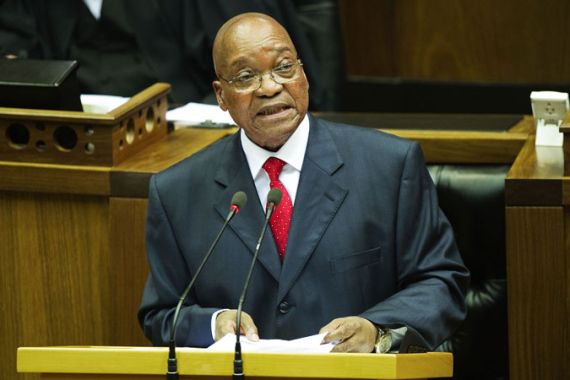South African president fires two ministers
Jacob Zuma sacks two cabinet members, suspends police chief and names panel to probe arms deal in anti-corruption drive.

 |
| Zuma’s announcement comes after weeks of pressure on his government to act decisively against corruption [EPA] |
Jacob Zuma, the South African president, has launched a major anti-corruption drive, sacking two ministers, suspending the police chief and naming a panel to probe a multi-billion-dollar arms deal.
The announcement, made in a televised address on Monday, marked Zuma’s most aggressive move yet to rein in corruption allegations which have dogged his government.
Zuma fired Sicelo Shiceka, the co-operative governance minister, and Gwen Mahlangu Nkabinde, the public works minister, and suspended Bheki Cele, the police chief, with immediate effect pending the outcome of a board of inquiry into allegations of illegal conduct.
Nkabinde and Cele were named in a government-sanctioned report for suspected illegal conduct in property rental deals.
Shiceka was suspected of spending $74,220 on un-sanctioned luxury travel, including overseas visits to a girlfriend imprisoned in Switzerland for drug smuggling.
‘Political watershed’
|
“What has happened is that Zuma’s administration has taken on the findings of the public protector, who has, for the first time, taken an active stance against corruption. The fact that Zuma has taken these findings on board makes it a political watershed “ – Steven Friedman |
Zuma also named a top judge to head a commission of inquiry into a multi-billion-dollar arms deal which involves claims of bribery in the country’s largest military contract.
Justice Willie Seriti, from the Supreme Court of Appeal, will head the panel, which also includes two judges from the Pretoria High Court, Zuma told reporters.
“Justice Seriti will chair the commission, which is expected to complete its work within two years,” Zuma said.
“We wish Justice Seriti and his team well in the execution of this important task.”
Steven Friedman, director of the Centre for the Study of Democracy in Johannesburg, described the move as “significant”.
“It is very significant and has nothing to do with party elections [due at the end of 2012]. Of course local media might try to show it to be the case, but they are not linked,” he told Al Jazeera.
“What has happened is that Zuma’s administration has taken on the findings of the public protector, who has, for the first time, taken an active stance against corruption.
“The fact that Zuma has taken these findings on board makes it a political watershed. “
“This decision is a result of pressure from the public protector [Thulisile Madonsela] and pressure from citizenry.”
The public protector is appointed by the president based on the recommendation of the National Assembly, and is designed to investigate and recommend corrective action based on complaints received from the public.
Andrew Feinstein, a former ANC MP who has written extensively about the ANC and the arms deal, also welcomed the move but said that Zuma “should have fired all three of them months ago, but, as usual, prevaricated endlessly”.
Hornets’ nest
Feinstein argues that Zuma was forced into forming a commission on the arms deal, which is considered a political hornets’ nest in South Africa, where the president himself had faced charges of fraud, money laundering and racketeering in connection with the 1999 deal.
“His lawyers were reluctant to file answering papers in an action before the Constitutional Court, demanding he appoint a Judicial Commission of Inquiry,” Feinstein, who resigned as a MP over the ruling party’s refusal to launch an investigation into the arms deal, told Al Jazeera.
“The people he has appointed [to the inquiry] are interesting and a little concerning.
“Now the crucial thing is whether the terms of reference are broad enough to include all the allegations of corruption, including against Zuma himself and the ANC. And whether the judges will have the courage to pursue these avenues.”
Charges against Zuma were dropped just before his election in 2009, after roiling South African politics for a decade.
The court verdict that dropped the charges against Zuma implied that Thabo Mbeki, the former president, had meddled in the prosecution of the case, which led to Zuma’s dismissal as deputy president in 2005.
Zuma’s administration has been accused of endemic corruption most prominently by one of its closest allies, the
labour federation COSATU, which is a long-time backer of the ruling African National Congress and a governing partner.
There have been almost no major prosecutions for corruption under Zuma, even though the president and ANC officials have made it a top priority to root out criminality.